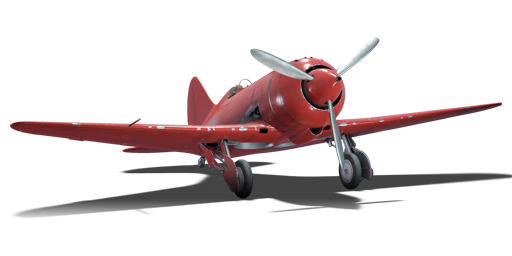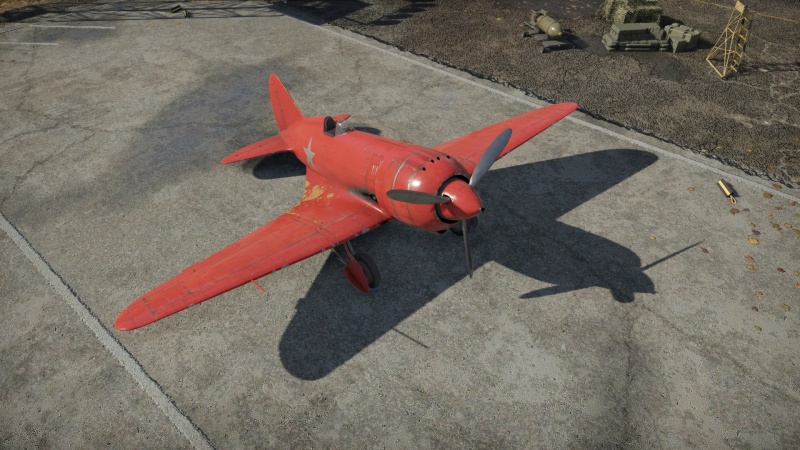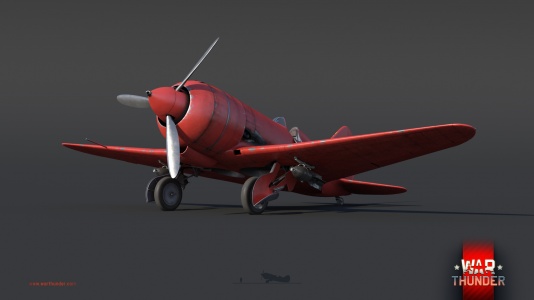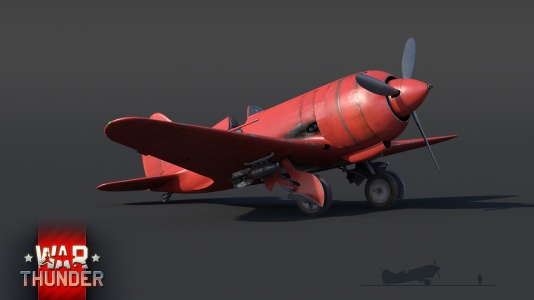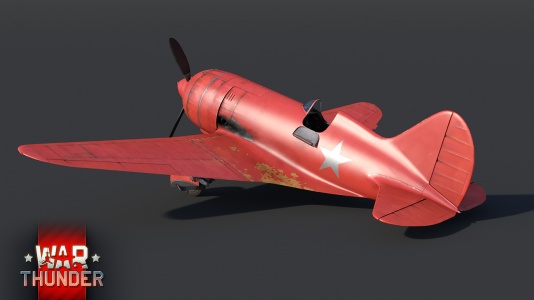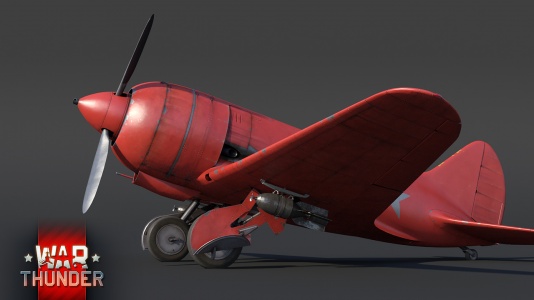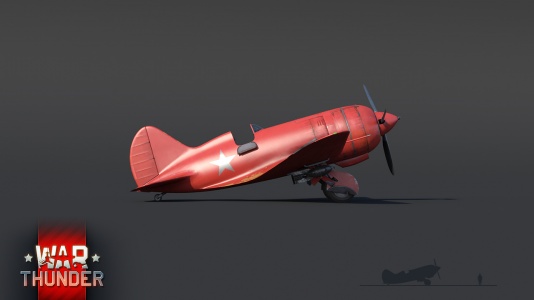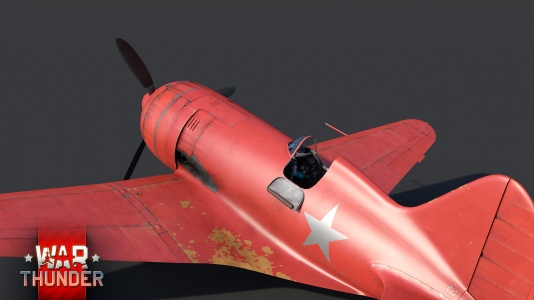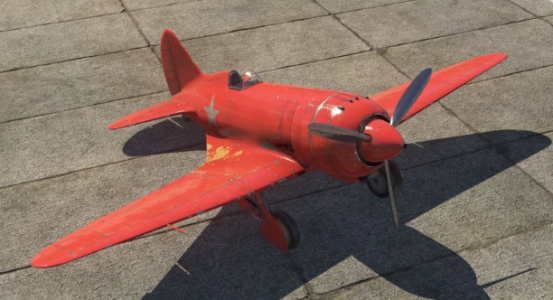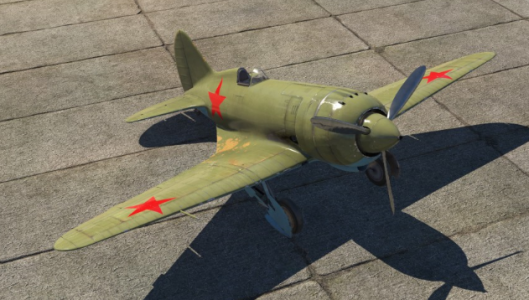Difference between revisions of "I-180S"
(→Flight performance) |
(Usage in battles and Pros/Cons) (Tag: Visual edit) |
||
| Line 13: | Line 13: | ||
{{Specs-Avia-Flight}} | {{Specs-Avia-Flight}} | ||
<!-- ''Describe how the aircraft behaves in the air. Speed, manoeuvrability, acceleration and allowable loads - these are the most important characteristics of the vehicle.'' --> | <!-- ''Describe how the aircraft behaves in the air. Speed, manoeuvrability, acceleration and allowable loads - these are the most important characteristics of the vehicle.'' --> | ||
| − | The I-180S is a quite a manoeuvrable aircraft | + | The I-180S is a quite a manoeuvrable aircraft at its BR, being able to turn better than many fighters of its tier. |
{| class="wikitable" style="text-align:center" width="70%" | {| class="wikitable" style="text-align:center" width="70%" | ||
| Line 106: | Line 106: | ||
<!-- ''Describe the tactics of playing in the aircraft, the features of using aircraft in a team and advice on tactics. Refrain from creating a "guide" - do not impose a single point of view, but instead, give the reader food for thought. Examine the most dangerous enemies and give recommendations on fighting them. If necessary, note the specifics of the game in different modes (AB, RB, SB).'' --> | <!-- ''Describe the tactics of playing in the aircraft, the features of using aircraft in a team and advice on tactics. Refrain from creating a "guide" - do not impose a single point of view, but instead, give the reader food for thought. Examine the most dangerous enemies and give recommendations on fighting them. If necessary, note the specifics of the game in different modes (AB, RB, SB).'' --> | ||
| − | + | You can climb to about 4,000-5,000 m of altitude at the beginning of the battle and use Boom & Zoom tactic to get rid of some low altitude enemies first. If there are any enemies above or at the same altitude as you, it is recommended to attempt to drag them into a dogfight. Head-on attacks are ill-advised against heavily armed and armored planes such as the [[F4U (Family)|F4U Corsair]], [[P-40 (Family)|P-40 Warhawk]], and [[Fw 190 (Family)|Fw 190]] because the I-180S lacks armor around many critical components, including the pilot and fuel tank. | |
| − | + | Although the I-180S is fairly maneuverable, there are some aircraft which can easily outturn it such as the British [[Spitfire (Family)|Spitfire]] and Japanese [[A6M (Family)|A6M Zero]]. Both of these fighter types have an excellent turn rate which means that dogfighting, even against a mediocre pilot, will most likely result in them getting on your tail. A recommended strategy to combat these types is to try to gain an altitude advantage or do a head-on with a quick snap-turn to out-run them and return for another pass. | |
=== Manual Engine Control === | === Manual Engine Control === | ||
| Line 138: | Line 138: | ||
* Great all-round fighter, a bit of turn fighter, a bit of Boom & Zoomer | * Great all-round fighter, a bit of turn fighter, a bit of Boom & Zoomer | ||
* Excellent climb rate due to supercharger | * Excellent climb rate due to supercharger | ||
| − | * | + | * Small size means small target |
| + | * Great manoeuvrability | ||
* Great roll rate | * Great roll rate | ||
| − | * | + | * Excellent armament packed tightly in the nose of the aircraft, making it easy to aim |
* Can carry bombs for ground attack | * Can carry bombs for ground attack | ||
| Line 147: | Line 148: | ||
* Engine tends to overheat, must be careful with WEP | * Engine tends to overheat, must be careful with WEP | ||
* Poor rudder control, difficult to perform wing-overs or hammerhead manoeuvres | * Poor rudder control, difficult to perform wing-overs or hammerhead manoeuvres | ||
| − | * | + | * Underarmoured for its tier |
| − | * | + | * Damage to the wings, control surfaces, or engine modules can unbalance the aircraft and or cripple performance |
== History == | == History == | ||
| Line 181: | Line 182: | ||
== See also == | == See also == | ||
''Links to the articles on the War Thunder Wiki that you think will be useful for the reader, for example:'' | ''Links to the articles on the War Thunder Wiki that you think will be useful for the reader, for example:'' | ||
| + | |||
* ''reference to the series of the aircraft;'' | * ''reference to the series of the aircraft;'' | ||
* ''links to approximate analogues of other nations and research trees.'' | * ''links to approximate analogues of other nations and research trees.'' | ||
Revision as of 21:19, 2 February 2022
Contents
Description
The I-180S is a premium gift rank Soviet fighter with a battle rating of (AB), (RB), and (SB). It was introduced during Update 1.87 "Locked On" as a reward for the 2019 "Battlefield Engineer" event.
General info
Flight performance
The I-180S is a quite a manoeuvrable aircraft at its BR, being able to turn better than many fighters of its tier.
| Characteristics | Max Speed (km/h at 6,500 m) |
Max altitude (metres) |
Turn time (seconds) |
Rate of climb (metres/second) |
Take-off run (metres) | |||
|---|---|---|---|---|---|---|---|---|
| AB | RB | AB | RB | AB | RB | |||
| Stock | 565 | 547 | 19.5 | 20.6 | 12.6 | 12.6 | 350 | |
| Upgraded | 607 | 585 | 18.5 | 19.0 | 21.5 | 16.6 | ||
Details
| Features | ||||
|---|---|---|---|---|
| Combat flaps | Take-off flaps | Landing flaps | Air brakes | Arrestor gear |
| X | ✓ | ✓ | X | X |
| Limits | ||||||
|---|---|---|---|---|---|---|
| Wings (km/h) | Gear (km/h) | Flaps (km/h) | Max Static G | |||
| Combat | Take-off | Landing | + | - | ||
| N/A | 362 | 250 | ~12 | ~6 | ||
| Optimal velocities (km/h) | |||
|---|---|---|---|
| Ailerons | Rudder | Elevators | Radiator |
| < 300 | < 240 | < 300 | > 190 |
Survivability and armour
- 8 mm Steel - Pilot's seat
- Large, single fuel tank in front of pilot
- Uncovered cockpit (no cockpit roof)
Modifications and economy
Armaments
Offensive armament
The I-180S is armed with:
- 2 x 12.7 mm Berezin UB machine guns, nose-mounted (220 rpg = 440 total)
- 2 x 7.62 mm ShKAS machine guns, nose-mounted (650 rpg = 1,300 total)
Suspended armament
The I-180S can be outfitted with the following ordnance:
- Without load
- 4 x 50 kg FAB-50sv bombs (200 kg total)
- 2 x 100 kg FAB-100sv bombs (200 kg total)
Usage in battles
You can climb to about 4,000-5,000 m of altitude at the beginning of the battle and use Boom & Zoom tactic to get rid of some low altitude enemies first. If there are any enemies above or at the same altitude as you, it is recommended to attempt to drag them into a dogfight. Head-on attacks are ill-advised against heavily armed and armored planes such as the F4U Corsair, P-40 Warhawk, and Fw 190 because the I-180S lacks armor around many critical components, including the pilot and fuel tank.
Although the I-180S is fairly maneuverable, there are some aircraft which can easily outturn it such as the British Spitfire and Japanese A6M Zero. Both of these fighter types have an excellent turn rate which means that dogfighting, even against a mediocre pilot, will most likely result in them getting on your tail. A recommended strategy to combat these types is to try to gain an altitude advantage or do a head-on with a quick snap-turn to out-run them and return for another pass.
Manual Engine Control
| MEC elements | ||||||
|---|---|---|---|---|---|---|
| Mixer | Pitch | Radiator | Supercharger | Turbocharger | ||
| Oil | Water | Type | ||||
| Controllable | Controllable Not auto controlled |
Controllable Not auto controlled |
Controllable Not auto controlled |
Separate | Controllable 2 gears |
Not controllable |
- Manual activation
- For those who manually activate the gearing, switch to second gear around 3,500 meters and drop the drop climb angle to 10-12 degrees which will make most effective use of the aircraft's engine and supercharger.
Pros and cons
Pros:
- Great all-round fighter, a bit of turn fighter, a bit of Boom & Zoomer
- Excellent climb rate due to supercharger
- Small size means small target
- Great manoeuvrability
- Great roll rate
- Excellent armament packed tightly in the nose of the aircraft, making it easy to aim
- Can carry bombs for ground attack
Cons:
- Engine tends to overheat, must be careful with WEP
- Poor rudder control, difficult to perform wing-overs or hammerhead manoeuvres
- Underarmoured for its tier
- Damage to the wings, control surfaces, or engine modules can unbalance the aircraft and or cripple performance
History
Development of the I-180 began in 1938, with the Polikarpov design bureau starting work on creating a new aircraft to meet the requirements of the Soviet Air Force at the time. In order to do so, engineers decided to base the new machine on a modified I-16 design and to install a more powerful radial engine. As a result, the I-180 was created. However, development and testing of prototypes was plagued with numerous issues, including many accidents. This, coupled with the arrival of new Soviet fighter designs quickly cast a shadow on the I-180 project which ultimately led to the project being cancelled by the end of 1940. Prior to the cancellation, a production version of the machine - the I-180S was built but only in very limited numbers. In total, around 13 I-180s were built, including prototypes, but none saw any active service.
- From Devblog
Media
- Skins
- Images
- Videos
See also
Links to the articles on the War Thunder Wiki that you think will be useful for the reader, for example:
- reference to the series of the aircraft;
- links to approximate analogues of other nations and research trees.
External links
| Polikarpov Design Bureau (Опытное конструкторское бюро Поликарпова) | |
|---|---|
| I-15 | I-15 WR · I-15 M-22 · I-15 M-25 · I-15bis · Krasnolutsky's I-15bis |
| I-153 | I-153 M-62 · Zhukovsky's I-153-M62 · I-153P |
| I-16 | I-16 type 5 · I-16 type 10 · I-16 type 18 · I-16 type 24 · I-16 type 27 · I-16 type 28 |
| I-180 | I-180S · I-185 (M-71) · I-185 (M-82) |
| ITP | ITP (M-1) |
| Twin-engine fighters | TIS MA |
| Bombers | Po-2 · Po-2M |
| Export | ␗I-15bis · ␗I-153 M-62 · ␗I-16 type 5 · ␗I-16 type 10 · ␗I-16 type 17 · ␗I-16 Chung 28 |
| USSR fighters | |
|---|---|
| I-15 | I-15 WR · I-15 M-22 · I-15 M-25 · I-15bis · Krasnolutsky's I-15bis |
| I-153 M-62 · Zhukovsky's I-153-M62 · I-153P | |
| I-16 | I-16 type 5 · I-16 type 10 · I-16 type 18 · I-16 type 24 · I-16 type 27 · I-16 type 28 · I-180S |
| I-29 | I-29 |
| I-185 | I-185 (M-71) · I-185 (M-82) |
| I-225 | I-225 |
| ITP | ITP (M-1) |
| MiG-3 | MiG-3-15 · MiG-3-15 (BK) · MiG-3-34 |
| LaGG | I-301 · LaGG-3-4 · LaGG-3-8 · LaGG-3-11 · LaGG-3-23 · LaGG-3-34 · LaGG-3-35 · LaGG-3-66 |
| La | La-5 · La-5F · La-5FN · La-7 · Dolgushin's La-7 · La-7B-20 · La-9 · La-11 |
| Yak-1/7 | Yak-1 · Yak-1B · Yak-7B |
| Yak-3 | Yak-3 · Eremin's Yak-3(e) · Yak-3P · Yak-3T · Yak-3U · Yak-3 (VK-107) |
| Yak-9 | Yak-9 · Yak-9B · Golovachev's Yak-9M · Yak-9T · Yak-9K · Yak-9U · Yak-9UT · Yak-9P |
| Other countries | ▂P-40E-1 · ▂P-47D-27 · ▂Hurricane Mk IIB · ▂Fw 190 D-9 · ▂Spitfire Mk IXc |
| P-39 | ▂P-39K-1 · ▂Pokryshkin's P-39N-0 · ▂P-39Q-15 |
| P-63 | ▂P-63A-5 · ▂P-63A-10 · ▂P-63C-5 |
| USSR premium aircraft | |
|---|---|
| Fighters | Krasnolutsky's I-15bis · I-16 type 28 · Zhukovsky's I-153-M62 · I-153P · I-180S · I-301 · ITP (M-1) |
| LaGG-3-4 · LaGG-3-23 · LaGG-3-34 · Dolgushin's La-7 · La-11 | |
| Eremin's Yak-3(e) · Yak-3 (VK-107) · Yak-3T · Golovachev's Yak-9M | |
| ▂P-39K-1 · ▂Pokryshkin's P-39N-0 · ▂P-39Q-15 · ▂P-40E-1 · ▂P-47D-27 · ▂P-63A-5 · ▂P-63A-10 · ▂P-63C-5 | |
| ▂Hurricane Mk IIB · ▂Spitfire Mk IXc · ▂Fw 190 D-9 | |
| Twin-engine fighters | I-29 |
| Jet fighters | Su-11 · MiG-15bis ISh · MiG-17AS · MiG-21S (R-13-300) · MiG-23ML |
| Strike aircraft | IL-2M "Avenger" · IL-2 M-82 · IL-8 (1944) · Su-6 · Tandem MAI · TIS MA · Su-8 · Tu-1 |
| Yak-38 · Su-7BMK · Su-25K · Su-39 | |
| Bombers | Po-2M · Be-6 · MBR-2-M-34 · Pe-2-205 · TB-3M-17-32 |
| ▂PBY-5A Catalina · ▂Hampden TB Mk I · ▂A-20G-30 · ▂B-25J-30 | |


